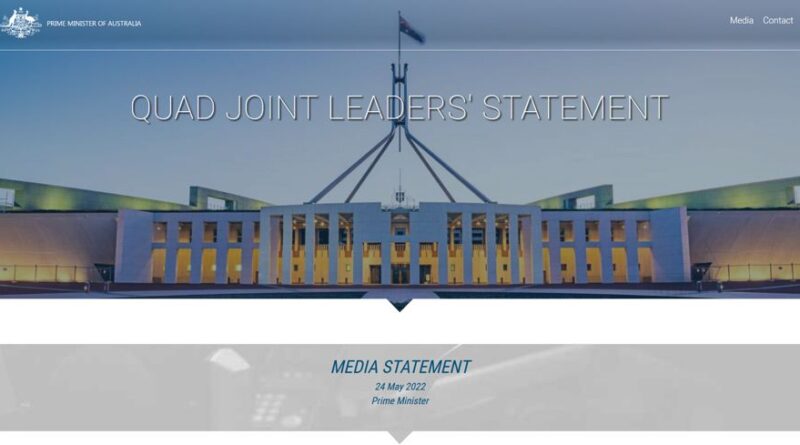Prime Minister of Australia: Quad Joint Leaders’ Statement
Media Statement
24 May 2022
Prime Minister
Today, we—Prime Minister Anthony Albanese of Australia, Prime Minister Narendra Modi of India, Prime Minister Fumio Kishida of Japan, and President Joe Biden of the United States—convene in Tokyo to renew our steadfast commitment to a free and open Indo-Pacific that is inclusive and resilient.
Just over one year ago, Leaders met for the first time. Today in Tokyo, we convene for our fourth meeting, and our second in person, to demonstrate, at a time of profound global challenge, that the Quad is a force for good, committed to bringing tangible benefits to the region. In our first year of cooperation, we established the Quad’s dedication to a positive and practical agenda; in our second year, we are committed to deliver on this promise, making the region more resilient for the 21st century.
With the COVID-19 pandemic still inflicting human and economic pain around the world, tendencies for unilateral actions among states and a tragic conflict raging in Ukraine, we are steadfast. We strongly support the principles of freedom, rule of law, democratic values, sovereignty and territorial integrity, peaceful settlement of disputes without resorting to threat or use of force, any unilateral attempt to change the status quo, and freedom of navigation and overflight, all of which are essential to the peace, stability and prosperity of the Indo-Pacific region and to the world. We will continue to act decisively together to advance these principles in the region and beyond. We reaffirm our resolve to uphold the international rules-based order where countries are free from all forms of military, economic and political coercion.
Peace and Stability
We discussed our respective responses to the conflict in Ukraine and the ongoing tragic humanitarian crisis, and assessed its implications for the Indo-Pacific. Quad Leaders reiterated our strong resolve to maintain the peace and stability in the region. We underscored unequivocally that the centrepiece of the international order is international law, including the UN Charter, respect for sovereignty and territorial integrity of all states. We also emphasized that all countries must seek peaceful resolution of disputes in accordance with international law.
The Quad is committed to cooperation with partners in the region who share the vision of a free and open Indo-Pacific. We reaffirm our unwavering support for ASEAN unity and centrality and for the practical implementation of ASEAN Outlook on the Indo-Pacific. We welcome the EU’s Joint Communication on the EU Strategy for Cooperation in the Indo-Pacific which was announced in September 2021 and increased European engagement in the Indo-Pacific region. We will champion adherence to international law, particularly as reflected in the UN Convention on the Law of the Sea (UNCLOS), and the maintenance of freedom of navigation and overflight, to meet challenges to the maritime rules-based order, including in the East and South China Seas. We strongly oppose any coercive, provocative or unilateral actions that seek to change the status quo and increase tensions in the area, such as the militarization of disputed features, the dangerous use of coast guard vessels and maritime militia, and efforts to disrupt other countries’ offshore resource exploitation activities.
Individually and collectively, we will further strengthen our cooperation with Pacific island countries, to enhance their economic well-being, strengthen health infrastructure and environmental resilience, to improve their maritime security and sustain their fisheries, to provide sustainable infrastructure, to bolster educational opportunities, and to mitigate and adapt to the impacts of climate change, which pose especially serious challenges for this region. We are committed to working together to address the needs of Pacific island partners. We reaffirmed our support for Pacific Islands Forum unity and for Pacific regional security frameworks.
Among ourselves and with our partners, we will deepen our cooperation in multilateral institutions, including at the United Nations, where reinforcing our shared priorities to reform and enhance the resilience of the multilateral system itself. Individually and together, we will respond to the challenges of our time, ensuring that the region remains inclusive, open, and governed by universal rules and norms.
We reaffirm our commitment to the complete denuclearization of the Korean Peninsula, consistent with United Nations Security Council Resolutions (UNSCRs) and also reconfirm the necessity of immediate resolution of the issue of Japanese abductees. We also condemn North Korea’s destabilizing ballistic missile development and launches, including multiple intercontinental ballistic missile tests, in violation of UNSCRs, and call on the international community to fully implement these resolutions. We urge North Korea to abide by all of its obligations under the UNSCRs, refrain from provocations, and engage in substantive dialogue.
We remain deeply concerned by the crisis in Myanmar, which has caused grave humanitarian suffering and posed challenges to regional stability. We continue to call for the immediate end to violence in Myanmar, the release of all political detainees, including foreigners, engagement in constructive dialogue, humanitarian access, and the swift restoration of democracy. We reaffirm our support for ASEAN-led efforts to seek a solution in Myanmar and welcome the role of Special Envoy of the ASEAN Chair. We further call for the urgent implementation of the ASEAN Five Point Consensus.
We condemn unequivocally terrorism and violent extremism in all its forms and manifestations and reiterate that there can be no justification for acts of terror on any grounds whatsoever. We denounce the use of terrorist proxies and emphasize the importance of denying any logistical, financial or military support to terrorist groups which could be used to launch or plan terror attacks, including cross-border attacks. We reiterate our condemnation of terrorist attacks, including 26/11 Mumbai and Pathankot attacks. We also reaffirm UNSC Resolution 2593 (2021), which demands that Afghan territory must never again be used to threaten or attack any country or to shelter or train terrorists, or to plan or finance terrorist attacks. We emphasize the importance of upholding international standards on anti-money laundering and combating the financing of terrorism by all countries, consistent with FATF recommendations. We reaffirm that in our fight against global terrorism, we will take concerted action against all terrorist groups, including those individuals and entities designated pursuant to the UNSC Resolution 1267(1999).
COVID-19 and Global Health Security
For more than two years, the world has grappled with the devastating impacts of COVID-19 – on our communities, citizens, health workers and systems and economies. The Quad countries have led and will continue to lead global efforts for COVID-19 response, with a view to building better health security and strengthening health systems. We commit to adapt our collective approaches to get ahead of the virus with a focus on preparing for new variants, and getting vaccines, tests, treatments, and other medical products to those at highest risk.
To date, the Quad partners have collectively pledged approximately USD $ 5.2 billion to the COVAX AMC, approximately 40 percent of the total contributions from government donors. We are proud to have delivered over 670 million doses, including at least 265 million doses to Indo-Pacific. Noting significant expansion in the global supply of COVID-19 vaccines, we will continue to share safe, effective, affordable and quality-assured COVID-19 vaccines where and when they are needed.
We welcome the progress on the expansion of J&J vaccine production at the Biological E facility in India under the Quad Vaccine Partnership– sustainable manufacturing capacity will yield long-term benefit in the fight against COVID-19 and future pandemics. In this regard, we look forward to the grant of WHO’s EUL approvals regarding the aforementioned vaccines in India. We celebrate the donation by the Quad to Cambodia and Thailand of WHO approved Made in India vaccines, together with Quad members’ other vaccine related support, as an example of tangible achievement of our collaboration.
We will continue to address both the COVID-19 response and preparedness against future health threats. We will accelerate getting shots in arms through last mile support of which over 2 billion USD has been provided in more than 115 countries globally by our four countries, and will also address vaccine hesitancy through a Quad-convened event this week at the World Health Assembly. We will coordinate our efforts including through the “COVID-19 Prioritized Global Action Plan for Enhanced Engagement (GAP),” and COVAX Vaccine Delivery Partnership. We welcome the successful 2nd Global COVID-19 Summit co-hosted by the United States, and joined by the Quad members, which galvanized $3.2 billion in financial and policy commitments. We will strengthen support for economic and social revitalization in the Indo-Pacific region.
In the long term, we will strengthen the global health architecture and pandemic prevention, preparedness and response (PPR) to build better health security, including by enhancing finance and health coordination and bolstering on-going science and technology cooperation, such as through clinical trials and genomic surveillance. Building on existing Quad collaboration, we will enhance our capacity to improve early detection and monitor new and emerging pathogens with pandemic potential, and work to increase resilience to epidemics and pandemics. For the development of new vaccines to prevent and contain infectious diseases, Quad partners have collectively committed $524 million to the next phase of CEPI’s work, accounting for about 50 percent of the total public investors.
We commit, as members of the Group of Friends of UHC, to take global leadership to further strengthen and reform the global health architecture for enhancing PPR and promoting UHC in the lead up to the UN High Level Meeting on UHC to be held in 2023.
Infrastructure
We reaffirmed our shared commitment to deepen cooperation on infrastructure, which is critical to driving productivity and prosperity in the Indo-Pacific region. We also share a commitment to addressing debt issues, which have been exacerbated by the pandemic in many countries.
Quad partners bring decades of skills and experience together to catalyse infrastructure delivery to the region. We are committed to working closely with partners and the region to drive public and private investment to bridge gaps. To achieve this, Quad will seek to extend more than 50 billion USD of infrastructure assistance and investment in the Indo-Pacific, over the next five years.
We will work to strengthen capacities of the countries in need to cope with debt issues under the G20 Common Framework and by promoting debt sustainability and transparency in close collaboration with finance authorities of relevant countries, including through the “Quad Debt Management Resource Portal,” which consists of multiple bilateral and multilateral capacity building assistance.
We also welcome the meeting of the development finance institutions and agencies of the four countries in the margins of the Quad Leaders’ Meeting. We are working closely with experts, our region and each other to link our toolkits and expertise to better connect the Indo-Pacific.
We will further deepen collaboration and pursue complementary actions in identified areas, such as regional and digital connectivity, clean energy, and climate resilience including disaster resilience in energy related facilities that reflect the region’s priorities including ASEAN Outlook on the Indo-Pacific, to contribute to sustainable and inclusive growth in the region.
Climate
Recognizing the urgent need to address climate change as emphasized in the latest IPCC reports, we will steadfastly implement the Paris Agreement and deliver on the outcomes of COP26, accelerating our efforts to raise global ambition, including reaching out to key stakeholders in the Indo-Pacific region and supporting, strengthening, and enhancing climate actions by partners in the region including through mobilizing climate finance, both public and private, and facilitating the research, development, and deployment of innovative technology.
Today, we launch the “Quad Climate Change Adaptation and Mitigation Package (Q-CHAMP)” with “mitigation” and “adaptation” as its two themes. Q-CHAMP includes ongoing activities under the Quad Climate Working Group on: green shipping and ports aiming for a shared green corridor framework building on each Quad country’s input; clean energy cooperation in clean hydrogen and methane emissions from the natural gas sector; strengthening clean energy supply chains, welcoming the contribution of the Sydney Energy Forum; climate information services for developing an engagement strategy with Pacific island countries; and disaster risk reduction, including disaster and climate resilient infrastructure such as the efforts through the Coalition for Disaster Resilient Infrastructure (CDRI). Its coverage includes new cooperation in clean fuel ammonia, CCUS/Carbon Recycling, cooperation and capacity building support to advance high integrity carbon markets under Article 6 of the Paris Agreement, climate-smart agriculture, knowledge sharing on subnational climate actions, and ecosystem-based adaptation. To make Q-CHAMP tangible, we are committed to expanding our programs, in support of climate actions between our four countries as well as in the Indo-Pacific region. We recognize the immense challenges posed by climate change to the island nations of the Pacific.
We welcome the new Australian Government’s commitment to stronger action on climate change, including through passing legislation to achieve net zero by 2050 and lodging a new, ambitious Nationally Determined Contribution.
Cybersecurity
In an increasingly digital world with sophisticated cyber threats we recognize an urgent need to take a collective approach to enhancing cybersecurity. To deliver on the Quad Leaders’ vision for a free and open Indo-Pacific, we commit to improving the defense of our nations’ critical infrastructure by sharing threat information, identifying and evaluating potential risks in supply chains for digitally enabled products and services, and aligning baseline software security standards for government procurement, leveraging our collective purchasing power to improve the broader software development ecosystem so that all users can benefit. The Quad partners will coordinate capacity building programs in the Indo-Pacific region under the Quad Cybersecurity Partnership, and will initiate the first-ever Quad Cybersecurity Day to help individual internet users across our nations, the Indo-Pacific region, and beyond to better protect themselves from cyber threats.
Critical & Emerging Technologies
The Quad remains focused on harnessing critical and emerging technologies to enhance the prosperity and security of the region. In the area of 5G and beyond 5G, while welcoming the Prague Proposals on Telecommunications Supplier Diversity, we will advance interoperability and security through the signature of a new Memorandum of Cooperation on 5G Supplier Diversification and Open RAN. We are also deepening our engagement with industry, including through Open RAN Track 1.5 events, and exploring ways to collaborate on the deployment of open and secure telecommunications technologies in the region.
We have mapped the Quad’s capacity and vulnerabilities in global semiconductor supply chains and have decided to better leverage our complementary strengths to realize a diverse and competitive market for semiconductors. The Common Statement of Principles on Critical Technology Supply Chains, launched on the occasion of this Summit, advances our cooperation on semiconductors and other critical technologies, providing a cooperative foundation for enhancing our resilience against various risks to the region. Our cooperation in the international standardization organizations, such as the Telecommunication Standardization Bureau of the International Telecommunication Union, has made great progress, and we expect to strengthen such cooperation through the new International Standards Cooperation Network (ISCN). This cooperation will help ensure technology development in the region is guided by our shared democratic values. We continue to strengthen our horizon scanning cooperation following our deepened discussions in biotechnology through our efforts on mapping and a corresponding Track 1.5 and a future focus on quantum technologies. We will convene a business and investment forum for networking with industry partners to expand capital for critical and emerging technologies.
Quad Fellowship
We recognize that people to people ties are the bedrock of the Quad and welcome the official launch of the Quad Fellowship, which is now open for application. The Quad Fellowship will bring 100 students from our countries to the United States each year to pursue graduate degrees in STEM fields, and is administered by Schmidt Futures. The first class of Quad Fellows will begin their studies in the third quarter of 2023, and we look forward to building together a talented cohort of next-generation STEM minds who will lead our countries in cutting-edge research and innovation.
Space
Space-related applications and technologies can also contribute to addressing common challenges such as climate change, disaster preparedness and response, and sustainable uses of oceans and marine resources. Each Quad partner will endeavor to improve public access to Earth observation satellite data and applications. We will work together to create an Earth observation-based monitoring and sustainable development framework. We will endeavor to share space-based civil Earth observation data, along with providing a “Quad Satellite Data Portal” that aggregates links to our respective national satellite data resources. We will work together to develop space applications, including in the area of Earth observations, and provide capacity building support to countries in the region, including with regards to partnering on using space capabilities to respond to extreme precipitation events. We will also consult on rules, norms, guidelines and principles for the sustainable use of space, and extend support to countries in the region through joint workshops including in relation to the UN Committee on the Peaceful Uses of Outer Space (COPUOS) Guidelines for the Long-Term Sustainability of Outer Space Activities.
Maritime Domain Awareness and HADR
We welcome a new maritime domain awareness initiative, the Indo-Pacific Partnership for Maritime Domain Awareness (IPMDA), designed to work with regional partners to respond to humanitarian and natural disasters, and combat illegal fishing. IPMDA will support and work in consultation with Indo-Pacific nations and regional information fusion centers in the Indian Ocean, Southeast Asia, and the Pacific Islands by providing technology and training to support enhanced, shared maritime domain awareness to promote stability and prosperity in our seas and oceans. IPMDA embodies what the Quad stands for: catalyzing our joint efforts towards concrete results that help to make the region more stable and prosperous.
Delivering on our commitment following our virtual meeting on 3 March 2022, we announce today the establishment of the “Quad Partnership on Humanitarian Assistance and Disaster Relief (HADR) in the Indo-Pacific”. This Partnership will further strengthen our collaboration to effectively respond to disasters in the region.
Closing
Today, with a shared vision for a free and open Indo-Pacific, we once again emphasize the importance of fundamental values and principles, and commit to work tirelessly to deliver tangible results to the region. In doing so, we will regularize the Quad activities, including regular meetings by the Leaders and Foreign Ministers. We agree to hold our next in-person summit in 2023 hosted by Australia.



